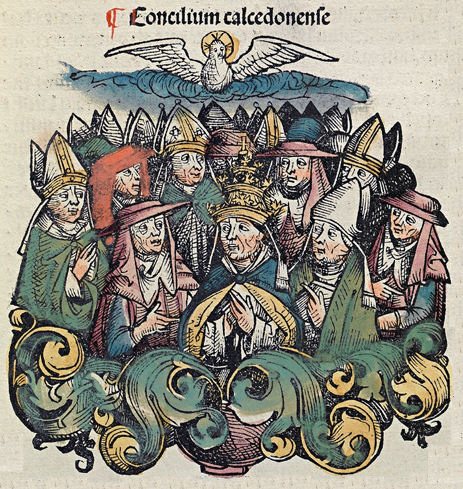 In part 3 we looked at a number of arguments relating to Jesus, God, and faith. Perhaps the most important was this:
In part 3 we looked at a number of arguments relating to Jesus, God, and faith. Perhaps the most important was this:
1. God doesn’t have faith.
2. Jesus is God.
3. Therefore, Jesus doesn’t have faith. (1, 2)
I argued in part 1 that 3 is ruled out by New Testament teaching. And given that the above argument is valid, it can’t be that both 1 and 2 are true; at least one of them must be false. But evangelical tradition commits strongly to both 1 and 2. But in theory, evangelicals are catholics – they are, as they say, “committed to historic Christian orthodoxy.”
Here’s a more traditionally catholic approach to this argument:
- “God” in 1 is ambiguous. Does it refer to the Father, the Son, or the Holy Spirit, or to the Holy Trinity?
- We think 1 is true on any of these except the second. It is false that the Son doesn’t have faith.
- Or, if 1 is rather making a general point, that nothing with the divine nature has faith, then we say that is false, for the Son has it, and has faith.
- BUT, maybe the point is that a being with the divine nature, as divine, doesn’t have faith.
- That we think is true. So let’s understand 1 as 1a: One who has the divine nature doesn’t, as such, have faith.
- Now what does 2 mean? We would take it to mean that Jesus has the divine nature. So 2a: Jesus has the divine nature.
- 3 is ambiguous.
- Does it mean: 3a: Jesus, as man, doesn’t have faith? (We think this is false.)
- Or does it mean 3b: Jesus, as God, doesn’t have faith? (We think this is true.)
- Don’t forget that Jesus is one person with two natures, as was ruled in 451 at Chalcedon. As having a human nature, Jesus has faith. But as divine, Jesus doesn’t have faith.
Therefore, on the traditional catholic perspective, this is a valid and sound argument:
1a: One who has the divine nature doesn’t, as such, have faith.
2a: Jesus has the divine nature.
3b: Jesus, as God (as having the divine nature), doesn’t have faith.
What are we to make of this argument? One might think it is simply changing the subject, as there is nothing unclear about any premise in 1-3. “God” there is YHWH, the one true God, the God of Israel, creator of the heavens and the earth. 2 is a simple identity claim. And 3 clearly follows from 1 and 2. I agree that nothing is unclear in 1-3. In contrast, the “as” language is 1a and 3b is unclear.
And this is the heart of this catholic response: that we can accept that Jesus has faith, and that Jesus doesn’t have faith. Of course, Jesus can’t both have and lack faith in the same time and in the same way. That’d violate the principle of non-contradiction. We must make a distinction, and it is not of different times. Rather, read in one way, “Jesus has faith” is true, and read differently, it is false.
But just what is this distinction? There are seemingly only three components to “Jesus has faith” – the subject (Jesus), the copula (has), and the predicate (faith). The claim must be that one of these terms is ambiguous, and if we can recognize the distinction, we’ll see how “Jesus has faith” is true using one interpretation, but false using the other. Let’s try the options:
- subject: Jesus’s divine nature doesn’t have faith, but Jesus’s human nature has faith.
- Two problems here:
- if a nature is something that can have faith, then seemingly natures are selves, something like souls.
- But this heretical Nestorianism.
- And more importantly, it is a terrible interpretation of the NT that there are two selves in Jesus’s body.
- The other problem is that the catholic idea seems to be that one and the same self – Jesus has both divine and human attributes – not two different beings (the human nature, the divine nature). If “Jesus has faith, and Jesus lacks faith” is parsed as “Jesus’s human nature has faith, and “Jesus’s divine nature lacks faith” – that’s consistent, but this is because we’re talking about two different subjects!
- if a nature is something that can have faith, then seemingly natures are selves, something like souls.
- Two problems here:
- copula: Jesus has-as-human faith, but Jesus doesn’t have-as-divine faith.
- Here, the subject is the same, but I don’t think anyone knows what it means to “have-as-human” or to “have-as-divine”. The suggested distinction is unintelligible.
- Unless they mean this, which is understandable: that Jesus has some feature because he’s human, and that he doesn’t have some feature because he’s divine.
- But then it would follow that one and the same Jesus both has and lacks the same feature, faith. The contradiction remains, under these easy to understand interpretations.
- Unless they mean this, which is understandable: that Jesus has some feature because he’s human, and that he doesn’t have some feature because he’s divine.
- Here, the subject is the same, but I don’t think anyone knows what it means to “have-as-human” or to “have-as-divine”. The suggested distinction is unintelligible.
- predicate: Jesus has this property: faith-as-human. Jesus lacks this property: faith-as-divine. One subject (Jesus) here, and only one meaning for “has,” but we’re not talking about having and lacking the same property (faith), but rather about having faith-as-human and lacking faith-as-divine.
- I understand what faith is. I have it, and Richard Dawkins lacks it. But I have no idea what it means to say that anyone has faith-as-human, or faith-as-divine.
- Of course, we do understand what it is to say that someone has faith because they’re a human, and lacks faith because they’re divine. But then, one and the same self would both have and lack faith; the contradiction would remain – “Jesus has faith because he’s human and Jesus lacks faith because he’s divine.” Well, then he both has and lacks faith, and that’s a contradiction.
- I understand what faith is. I have it, and Richard Dawkins lacks it. But I have no idea what it means to say that anyone has faith-as-human, or faith-as-divine.
 I have no doubt that some of my Catholic philosopher friends will have something to say here, but right now, I don’t see any way forward. The point of making a distinction (in subject, copula, or predicate) in “Jesus has faith” is to distinguish two different claims, one true and the other false. But there doesn’t appear at hand any intelligible distinction to make. So the move looks ad hoc, motivated only by a desire to save one’s theory that Jesus has the divine nature, in the face of NT testimony to Jesus’s faith, and the obvious truth that God (or just: any omnipotent and omniscient being) has no need of faith in God. It doesn’t give an understandable response to the argument at the top of this post, but at best hints that there is a distinction to be made somewhere.
I have no doubt that some of my Catholic philosopher friends will have something to say here, but right now, I don’t see any way forward. The point of making a distinction (in subject, copula, or predicate) in “Jesus has faith” is to distinguish two different claims, one true and the other false. But there doesn’t appear at hand any intelligible distinction to make. So the move looks ad hoc, motivated only by a desire to save one’s theory that Jesus has the divine nature, in the face of NT testimony to Jesus’s faith, and the obvious truth that God (or just: any omnipotent and omniscient being) has no need of faith in God. It doesn’t give an understandable response to the argument at the top of this post, but at best hints that there is a distinction to be made somewhere.
Yes, I’m well aware of the traditional arguments for Jesus having a/the divine nature. But those are another post. (Or series… or book!)
Next time: Mr. Gilson stands his ground.
(Here’s a link to all five of my posts in this series.)

Let’s not get stuck with Catholic doctrine, and whether the “two natures” of Christ entail, not only two distinct wills (one divine and one human – which is Catholic dogma since the Third Council of Constantinople in 681 CE) but also two distinct intellects (one divine and one human – which I don’t think is explicitly affirmed anywhere).
Let’s consider this:
12 For now we see in a mirror indirectly, but then we will see face to face. Now I know in part, but then I will know fully, just as I have been fully known. 13 And now these three remain: faith, hope, and love. But the greatest of these is love. (1 Cor 13:12-13)
Let’s also consider this:
Dear friends, we are God’s children now, and what we will be has not yet been revealed. We know that whenever it is revealed we will be like him, because we will see him just as he is. (1 John 3:2)
Now, I do not know about you guys, but, it seems to me that both the above quotations affirm that, after the resurrection, in life everlasting, the elect “will see [God] face to face”, “we will see him just as he is”.
The immediate consequence is that in the resurrection, NOT ONLY Jesus, BUT ALL elect will not need faith in God any more, because they will have a perfect direct intuition of Him.
Going back to Jesus, and his “two natures”, we can say that, during his earthly life, while, unlike us all, he had a unique knowledge of God, his Father, and of His Will, because he was the Incarnation of God’s eternal logos, he also, like us, because of his humanity, did not have a perfect direct intuition of God. Therefore he also like us, needed faith. Now he needs it no more. We are still waiting … 🙂
Comments are closed.